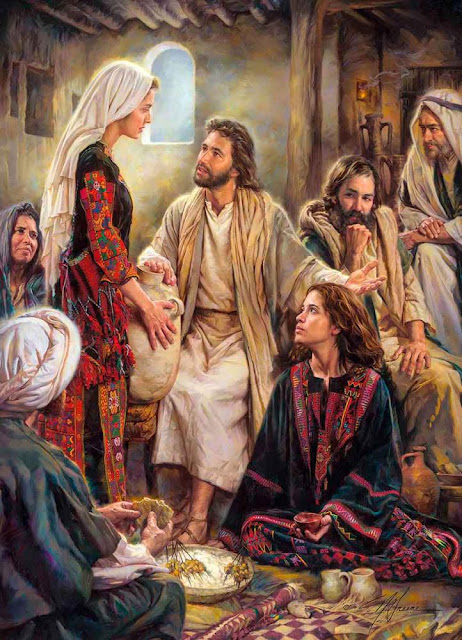“but only one thing is needed. Mary has chosen what is better, and it will not be taken away from her.” - Luke 10:42 (NIV)
Jesus comes to the home of Martha in the village of Bethany. He’s not alone. He has his 12 disciple with him. Martha the matriarch of the home wants to be a good host. Hospitality was important at this time in this culture. Jesus has some celebrity status and some notoriety in the religious establishment, and among the everyday person, at this time. Martha wants to impress however, the house is full and there are no local catering services so she has to do everything herself.
Men and women through the ages identify themselves by the jobs they do or their station in life. For women of the 1st century in Israel it was about being a homemaker and good hostess primarily. Martha didn’t want to fail at this job with Jesus in her home. Because if her hosting skills failed by extension she would fail therefore, her identity would take a hit, so to speak.
That’s why she ask for help from Mary. She didn’t asked for her brother Lazarus to help. Since Lazarus was a man in the cultural that would be something that would not be asked of him. Mary however would be expected to help with hosting duties. However, Mary was not concerned about her identity as a good hostess.
We identify ourselves today in many different ways.
By religion.
By nationality.
By sexual orientation.
By political belief.
By marital/familial status.
By gender.
By profession.
By race
By political affiliation
Most of us today are an amalgamation of several identities, some of which are more prominent and more important than others.
Our identities are usually fluid. Sometimes it depends on the context, environment, and most importantly people. The surrounding give you one identity over the other. Our identity changes multiple times a day.
The most prominent one, in today's culture, comes from the question that we ask one another when we first meet, “What do you do?”
Here’s what's great about this story in Luke. Jesus uses it as an opportunity to teach those there and us today what’s the most important identify we could take on or identify with.
During this time in 1st century Israel, while dining, people normally sat on chairs or, at banquets, reclined on couches; but disciples sat at the feet of their teachers. We see an expression of this in Acts 22:3 were Paul describes himself as under Gamaliel. The word “under” literally means “at his feet”.
Women could listen to Torah teaching in synagogues and occasionally one might listen to a rabbi's lectures, but they were not disciples sitting in the dust at rabbis' feet. Mary's positioning of herself and eagerness to absorb Jesus' teaching at the expense of a more traditional woman's role would have shocked most Jewish people. The people reading this gospel account during the first century would have probably thought the same thing. In the most advanced level of disciples included training to become rabbis; we know of no women who filled this role in antiquity. That’s why Martha was probably embolden to speak out against her sister. I could just see the disciples probably looking on in agreement with Martha.
Despite the cultural importance of Mary's identify, she broke from tradition and decided her identity as a disciple of Jesus is more important than anything else she could do.
I had a brother say the other day that he’s trying to figure out if he’s a carpenter that’s a disciple or a disciples that’s a carpenter.
From Jesus perspective I would say it’s a disciple that’s a carpenter. Jesus told Martha that Mary chose the better identify. Being identified as a disciple of Jesus Christ was better than being identified as a good hostess.
Does that ring true for us today? Do the people in our sphere know we are followers of Jesus Christ? Or do they just know you as a teacher, contractor, business owner, mom, dad, husband, wife, etc.? Jesus told us what was better.



Comments
Post a Comment